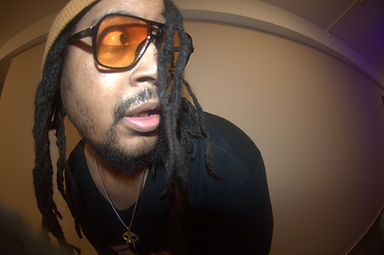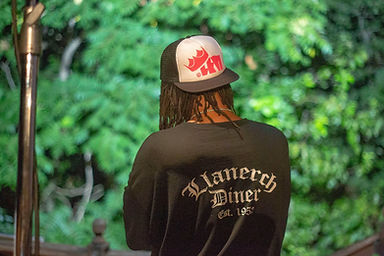"Professional Weirdo"
Miguélangelo Hexylvania
In an industry increasingly dominated by algorithmic thinking, Miguelangelo Hexylvania offers something genuinely rare: an authentic creative voice shaped by over two decades of real Hollywood experience. From working behind the camera on Martin Scorsese's "The Irishman" to appearing both in front of and behind the lens on M. Night Shyamalan's "Glass" (where keen viewers can spot him in the film's final scene), Hexylvania has absorbed the craft from every angle. His journey spans from underground skateboarding filmmaker to trained showrunner, from Marvel's Netflix universe production rooms to the pages of his provocative 2023 novel "Gossiping Ghosts and Classless Vampires."
His recent novel directly confronts the viral fame phenomenon reshaping our industry, exploring the psychological toll of internet scandals among elite youth with the precision of someone who has watched careers both made and destroyed by social media from inside Hollywood's machinery.

How do you come up with these characters?
I befriend the most unstable people I can and then I secretly write down their entire lives and sell the goods on eBay for pennies on the dollar, to writers of X-Files fanfiction.
Is any of this based on real experiences?
I’m coming to terms with the fact that everything I write seems to do with my time in Hollywood or New York. I don’t even realize I’m doing it anymore.
Can you tell me about the work you’ve done for Hollywood?
The short answer to that is that I was literally trained by two writers at Nickelodeon on how to operate as a showrunner. Here’s a fun fact: Disney Animation Studios (Burbank, CA) used to have Walking Dead comic books sitting around all over the place. I always thought that was fucking hysterical. I also did some acting but – that was more like; how Big Pete (Micheal C. Maronna) from The Adventures of Pete & Pete in real-life sometimes works behind the camera. In fact I checked out his IMDB recently and realized we’ve worked on some of the same fucking jobs (laughs). My life is kind of the opposite of his, though. Total contrast – I’m behind the wheel (in film production) and every now and again I step in front of the camera, dressed like the Fresh Prince or some shit, like in the Iggy Azalea video for her song, Fancy. You can catch me being, well, me. Honestly though, there’s stuff that I’m in from like ten years ago that I still haven’t seen. I feel like when you work in film you never actually have the time to watch anything. But every now and again, one of my actor-friends out of New York would drag me to see one of the Marvel movies at the Lincoln, since I was so deeply embedded in that whole world. I’m an MCU Easter Egg, it’s so weird to me. I just saw a film that RZA directed and I completely forgot that Method Man asked him to get my reaction shots. Method Man is really that dude. I think he’s like an inch taller than me. Man’s is like 6’5.





"I play 'town,' like Harriet in Harriet The Spy."
Which character was your favorite to write, in ‘Gossiping Ghosts & Classless Vampires’?
Alexis strikes a chord. She’s a survivor by trade and she’s often saying what everyone else is thinking but too scared to say out loud – and that’s me, all the way. I kind of just blurt shit out–like I really don’t give a flying fuck what room I’m in, I’m honestly always like this (laughs).
What is your writing process like?
I play “town”, like Harriet in Harriet The Spy. I think of a kind of person, and then I ask myself why they are the way that they are; and then I ask myself where they grew up and what their parents were like, and what their parents’ parents were like, and so on.
Describe your book in 10 words or less for new people.
Oh shit, you’re gonna make me flex my “elevator-pitch” muscle, huh? (laughs) Okay wow, okay okay, um, let’s see… damn, it’s been a minute… (pauses) okay, "24Hrs: Three Deaths & The Lie That Fooled Everyone." Boom
When did you start writing?
I was five years old, and I have some tiny accolade in the form of, like, one of those cheesy school awards?–from second grade, for “creative writing,” if you can even call it that; something that was written by a second grader.
(long pause)
I just watched something the other day; this interview with Wes Anderson where he said that if he had seen ‘Rushmore’ when he was fifteen, it would’ve changed his life—and I actually did see ‘Rushmore’ when I was fifteen–and that’s exactly what that film did for me. It’s also the first film I’ve ever seen in a movie theater, where when the end-credits rolled, absolutely ‘nobody’ left their seats until the credits ended. Absolutely nobody, and I looked. I couldn’t forget that if I tried, it was… just like, really cool, and a little surreal, I guess. It was this like, temporary, societal permission, to be as emotional as you really were. I was easily the youngest person in that theater, and even then, I knew it was one of those things where I just wouldn’t understand it until I was way older; but I remember feeling like Max in every way. I was this, like, over-under achiever who sucked ass at real school stuff, so I wrote stuff for my friends to act in. It felt like the universe was giving me a sign, honestly—and look, not for nothing, but the film starts in autumn; and me and my friend walked to the movies through mountains of leaves, and I hated him for making me walk to the damn movies, but now I think about it and I’m so glad that he did that... I also have no idea what the question was that you even asked me anymore. Just like, for the record or whatever.
What is the biggest takeaway you want readers to get?
Life is complicated.
What is your favorite line from the book?
“Boobs”... That’s it, that’s the whole line; just “Boobs.”
If your books were shelved between two other authors in a bookstore, who would you want them to be?
Between an anthology of The Twilight Zone screenplays by Rod Serling, and probably Less Than Zero, by Bret Easton Ellis. I know he (Bret) hates it cause it’s his first novel but I think it’s fucking genius.









